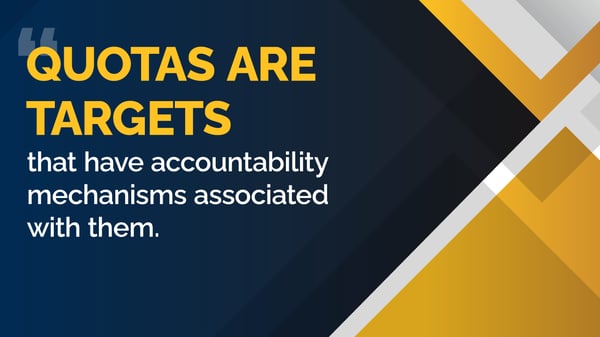Hello and welcome to the first episode of The RevOps Show! Revenue Operations is invigorating and exhausting, so our hosts, Jess and Doug, will be coming at you every week with a new episode to help you navigate this new concept. Whether it’s answering questions, working through scenarios, or something else, you’ll receive the knowledge and actions to work through your RevOps issues.
Audio:
Video:

Resources Mentioned in the Episode:
-
The Most Common & Costly Mistake Made With Sales Compensation
-
5 Questions You Must Answer Before Creating An Effective Sales Compensation Program
-
Sales Velocity - The Metric That Can Transform Your Customer & Revenue Acquisition
Show Notes:
The main focus today is on Sales Quotas. There are two parts to this - the approach and establishing targets for your sales team. What is it that actually motivates salespeople? For most companies they set quotas, but is that the right way to go about it? This topic comes from Jess as she wants to break apart why companies choose quotas and what other targets you can set for your sales team to motivate them outside of quotas.
First and foremost, what is a quota and what does that mean for most sales organizations?

Quotas are targets that have accountability mechanisms associated with them. If you make five calls and have five conversations that is not a quota because if those requirements aren’t met, there is no consequence. For most companies a quota is the primary target for the sales rep in terms of sales operations.
How do most people go about setting a quota?
Most people lick their finger and stick it up in the air...just kidding! Most people do forward looking forecasting by saying what they need to grow and then increasing everything by that percentage. So if you need to grow by 25%, you increase the quota by 25%.
It’s all about balancing the targets you have to achieve. You can have progressive quotas which look at the top 5 metrics that are important, but focuses on the one that is of utmost importance. You have to have structural impact.

Ultimately salespeople are motivated by one thing: winning, but not winning in the traditional sense. Scores are very important, but they aren’t motivated by the score, they are motivated by the dopamine hit that the score creates.
The game has to be bought into and has to have belief around it. The game has to be fair and challenging. When you set unreal expectations you create a negative equity. Simpler is better; simplistic is not always better. A good scoring mechanism should create agency/freedom. When sales reps have an understanding of what the game is, what the rules are and what the objective is, they can control the path they are going to take to get there.
One thing we recommend is a quota of a certain number of sales qualified accounts. You get a promotion - better title, higher pay, higher fidelity responsibility - by hitting those goals. You don’t have to ask for a raise or promotion, it just happens.
You have to incentivize behaviors. Are you setting quotas at inflection points to drive outcomes? If you have too many elements, things become complicated. Even something as simple as a contest works better. Where salespeople really go nuts is when their manager does something for them (i.e. takes a day of calls from them).
The overarching point is: you have to understand your business and your business process, making sure that it’s simple and easy to understand and that there is a clear score.
Next Steps:
-
Follow Jess, Doug & Lift on LinkedIn for updates on the show or other insights:
-
Subscribe to the show on Spotify & Apple Podcasts
-
Episode 2: KPIs Part 1: The What, When, Where & Why of Key Performance Indicators

.png)
.png)


